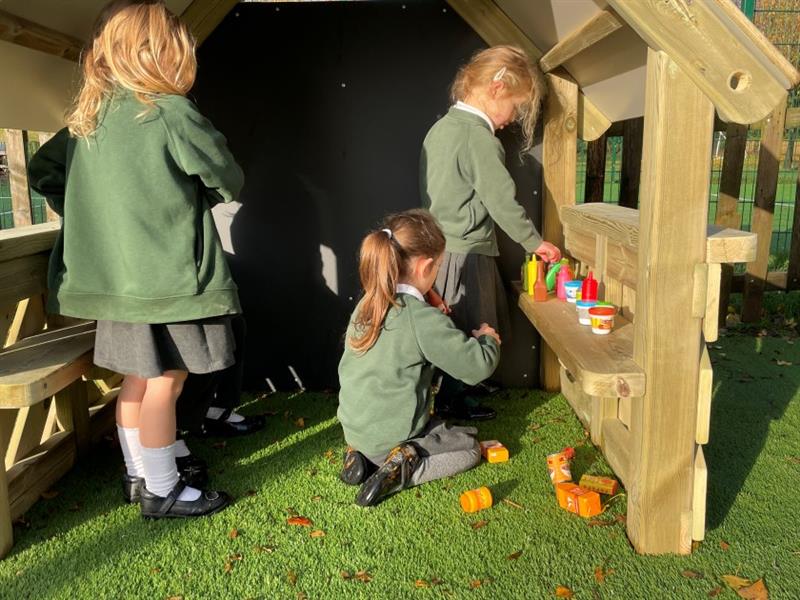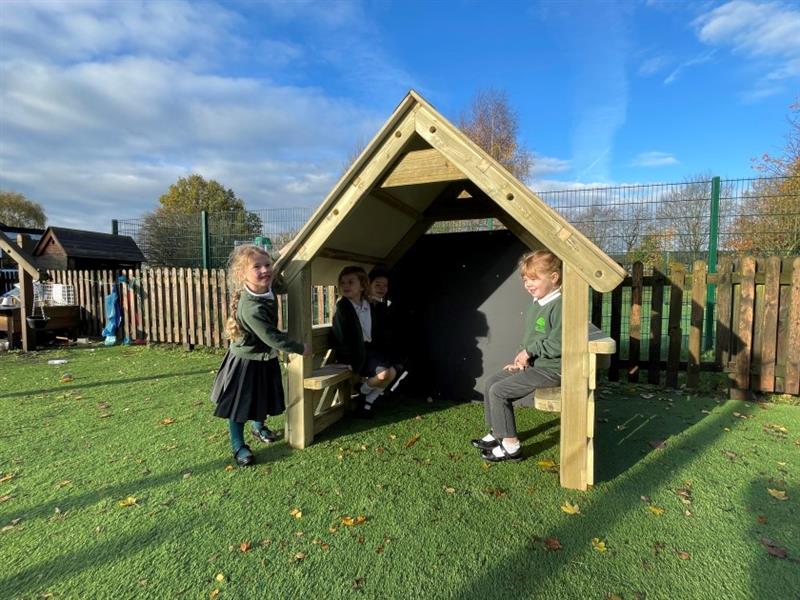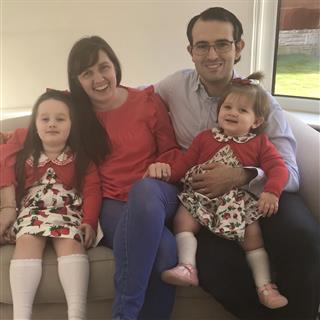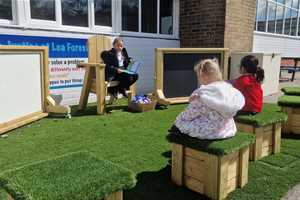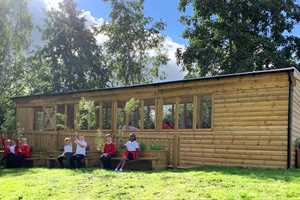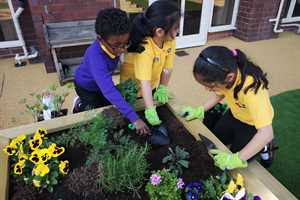
Outdoor Learning and Play
Create an Exciting Outdoor Role Play Area with a Pentagon Playhouse
Children are naturally inclined to engage in role play. Effective role play spaces can encourage children to revisit learning, explore possibilities and expand upon their experiences. Role play encourages children to mimic the world around them within a safe space, building their understanding of the world, and allowing them to process and comprehend things. This can be crucial in their social development, providing a space for children to learn not only about their own thoughts and feelings, but also how to understand their friends’ thoughts, feelings and methods of communication.
Play will often reflect what children know and experience, sometimes reflecting real life or entering into imaginary worlds. In role play fantasy and reality can mix as learners play on their own or with others. Problems and possibilities can be rehearsed and worked through allowing children to collaborate and learn alongside their peers.
The Importance of Role Play in EYFS
An effective role play area can help children to develop in all seven EYFS areas of learning.
Personal Social and Emotional Development
As children engage in role play, they learn to lead and follow appropriately and show an increased capacity for empathy. When confidence develops pupils co-operate, take turns and initiate ideas. Independence is displayed as children access the resources they need and learn how to work as part of a group in set roles. Pupils will learn to respect the ideas of others and to understand their point of view.
Communication and Language
Through pretend play children often use more words and more complex language structures than at other times of the day. Pupils will listen to the dialogue of other children and adults and learn to respond appropriately. Learners will experiment with language when playing different roles such as ‘Grandma, a waiter or Goldilocks.’ Children often role play known nursery rhymes and stories and use subject specific vocabulary related to role play themes such as a garden centre, potion lab or airport.
Understanding the World
Imaginative play connects children to their own home, family and community. Special occasions such as birthday parties, weddings and Christmas celebrations are often re-enacted as children talk about their families in relation to events.
When children play together, they begin to understand other cultures as they learn about different people in the local and wider community.
Through exploration pupils recognise how things work. Santa’s workshop, an artist’s studio or a garage allow children to select different materials and equipment including technology such as a till, phone or calculator.
Physical Development
Pupils develop fine motor skills as they manipulate tools such as dressing dolls and stuffed toys, wrapping presents in Santa’s workshop and cutting pizza slices in the restaurant. Coordination and gross motor skills are developed through den building and awareness of available space and how to share that with others.
Expressive Arts and Design
During role play children will use resources to enhance their play. Different materials can be used to make models and drawings. A selection of fabrics, pegs, belts, mirrors and hats can introduce children to different colours and textures whilst helping pupils to formulate characters. Pupils may create their own cards, invitations, menus and posters or items to be used in the shop/home corner.
Mathematics
Many mathematical concepts can be practised through role play as children weigh items in the shop, count out their coins to pay, fill up the jars in the sweet shop and refer to the concept of time whilst waiting in the surgery. Ordering, sorting, matching and counting will all take place in a laundrette role play space and pupils will begin to use mathematical vocabulary such as full/empty, more/less, heavy/light.
Product Spotlight
Literacy
Books, magazines and newspapers can create purposeful reading and writing activities when linked to role play. Pupils can read bedtime stories to the dolls, read signs and food packaging or make notes or labels. Telephones or walkie talkies can encourage children to use their voice, developing language skills.
Role Play and Speech Development
Communication and language is an EYFS prime area that is vital to all other stages of development. During role play children are able to share their ideas with support and modelling from an adult.
The first thing children tend to do in the role play area is to assign themselves ‘a role’ before then choosing a scenario/event to explore. Props and objects will be selected by children to facilitate their play which may be tangible, invisible or interpreted by pupils in different ways. At first children will create roles and situations that are familiar to them, acting, talking and dressing like people they know but over time ideas may become more abstract.
When children’s imaginations develop, they will be able to invent actions and situations, props may be used as something else entirely, a mat may become a space portal or a box will become a bed for the animals. As fantasy ideas develop children may use play to explore feelings and emotions such as fear, worry or excitement.
Over time children will enjoy playing in the company of others, they can enter into more complex scenarios with play lasting longer. When playing in groups pupils may not stick to one particular role, sometimes switching between characters and enjoying playing alongside adults to expand their experiences. As children become familiar with different characters/known people they will copy their language, speech patterns, clothing and mannerisms.
During role play pupils may begin to use more complex sentence structures, connecting ideas as they explain what is happening and anticipate what might happen next. Vocabulary that reflects their experiences will build as they explore the meaning and sounds of new words. Speech will be used to organise and sequence their ideas, feelings and events and stories will be woven into their play as they provide a narrative/storyline.
The use of texts to support role play encourages children to make sense of the world around them. Pupils love to re-enact stories that are familiar to them, sometimes interpreting them in their own way or creating their own twist to the tale. When children show enthusiasm and interest for a particular story a playhouse is a great place for them to explore it further. A resource box filled with items linked to the story can be a great stimulus to deepen learning.
Creating an Open-Ended Role Play Space
Learners tend to take part in three main types of role play:
- Domestic- relating directly to children’s home and family life.
- Transactional – involving goods/services and transactions with others such as a supermarket.
- Fantasy- scenes linked to stories or places that children are unlikely to visit such as Space.
Through observation practitioners will be able to respond to children’s current interests and enhance their role play space accordingly. An open-ended role play area provides more opportunities for children to develop their imagination and re-enact many different scenarios.
A role play area may become a hair salon, post office, doctor’s surgery or a mission control base using enhancements to add to provision. Children may not necessarily interpret stimulus and enhancements in the way that we expect, quite often interpreting objects as something else entirely! Even in a small group of children not all learners will think the same or view objects in the same way. However, this shows high levels of imagination and creative thinking. It can be useful if role play resources can be interpreted by pupils in various ways, leading to different outcomes dependent on current experiences and interests.
Introducing the Perfect Outdoor Playhouses
Pentagon’s Giant Playhouse and Small Wooden Playhouse are the ideal outdoor bases to create successful role play. The open- ended nature of the houses allows you to make a role play space that can change continually depending on the children using it.
Pentagon also offer an Essentials Playhouse, which is perfect if you have limited outdoor space to utilise. It still has the chalkboard back, and low sides for interaction with peers, but fits nicely into any playground space and is only £795!
The shop could become Grandma’s sitting room before transforming into a lighthouse all within the same morning session! The versatile nature of the houses challenges children to develop their imaginative skills producing high levels of engagement.
Both houses are big enough to fit groups of children, supporting child-led and adult initiated play. The plain black chalkboard allows pupils to practise mark making skills by producing their own drawings that are personal and relevant to their own role play scenarios. I have witnessed children drawing animals in the vet surgery as the animals are taken for an x-ray! Pupils are able to create drawings that enhance their play. Practitioners can take pictures of children’s drawing within provision when assessing mark making, fine motor or communication development.
A range of fabrics can be used to enhance creativity. Pupils can make their own costumes and choose to create den making spaces using the in-built den-making holes along the top of the playhouse.
Both playhouses allow adults to play alongside children to be able to move play forwards. Schools may have resource collections which children can access linked to children’s interests. Adults can model possible ways to use resources, offering new vocabulary and experiences by guiding play. Some children may choose to carry on elements of guided play when using resources independently whereas others may interpret what they have learned in their own way.
Having an outdoor role play area is so much fun for learners. Changing weather conditions, tree branches swaying overhead and birds singing can add a different dimension to dramatic play. Children are given freedom to move and to use their voices in different ways in the outdoor environment. With a Pentagon Playhouse pupils can often leave their play setup as it is, ready for them to return to and to make bigger and better. It can be difficult to do this indoors and on occasions play setups need to be returned to so that play can continue to grow and change.
Sometimes as practitioners we have elaborate ideas and role play setups can become time consuming to create and overwhelming for children. Often simple, open- ended, useful resources and props are all that children need and we can step back and watch as pupils make decisions and enter into their own world of imaginative play.



.jpg)
.jpg)
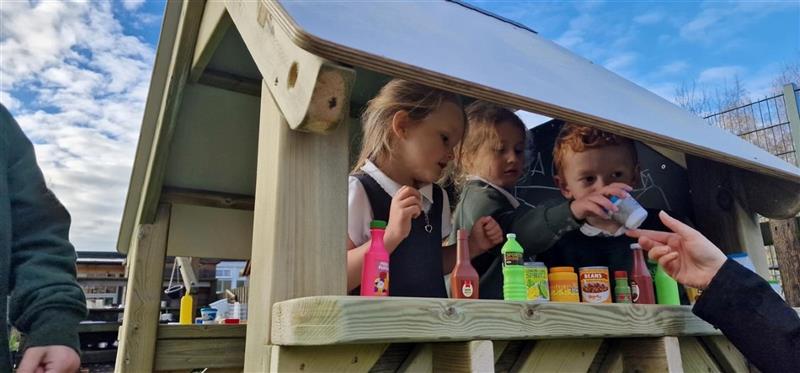
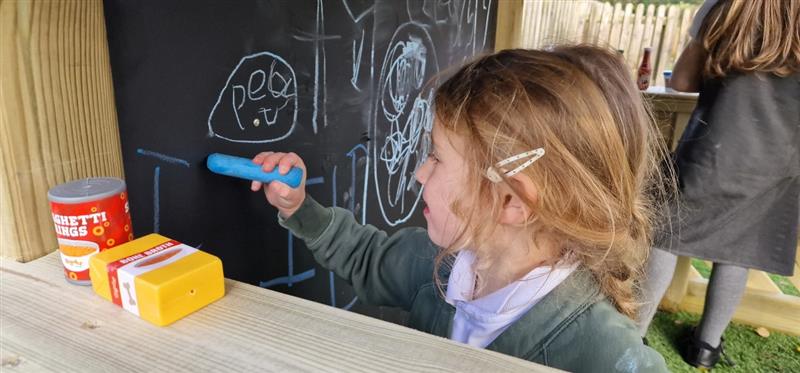
.jpg)
.png)

.jpg)
.jpg)
.jpg)
